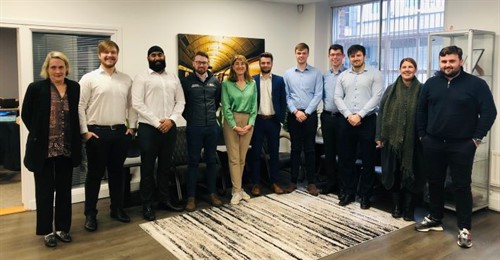Career Stories
Some of our members give an insight into their work stories, describing how they came to work in their current role, what a typical day entails and future aspirations.
Future Industry Group

It's great to have such a dynamic group of professionals to explore current and future opportunities and developments in construction, pertinent to manufacture of plastic piping systems in the UK . Our Future Industry Group, comprised of people new to the industry from our members’ businesses, discuss industry wide topics such as sustainability, diversity and the important role plastic pipes will play in the future of the construction industry.
Gary Bateman

Process Development Leader | Polypipe Civils & Green Urbanisation
Gary Bateman has over 37 years’ experience in extrusion line technology, and works at Polypipe Civils & Green Urbanisation’s flagship recycled products site in Horncastle, Lincolnshire. The site currently has 24 extrusion lines and is developing more, with a large element of the site’s pipe and ducting manufacture comprising recycled PP and PVC plastic materials.
A typical day for Gary begins by studying reports from the previous day and any issues raised by the night shift staff as the line must be ready to manufacture at all times, as well as interacting with suppliers constantly. “We may do some trials on new machines – we have a new extrusion line being installed at the moment – and there may also be trials to do for the development laboratory, looking at weight saving or a specific customer requirement – or a trial relating to new standards, perhaps”.
Manufacturing to the correct standard is very important from the 26mm diameter right up to the large 900mm pipes. Current regulations prohibit the use of recycled materials in some product areas such as sewer pipe, but they are approved for use in manufacturing the surface water pipe system for example and some other product lines. This is an increasingly important aspect of Gary’s work. “We get to know the machines really well and we have also learned to understand plastics very well too. Recycled plastic behaves differently from week to week compared to virgin plastic so it’s an ongoing challenge.”
It is also Gary’s responsibility to resolve any problems with the extrusion equipment. Recycled material tends to wear machinery faster than pure virgin material, which is also more elastic. Recently for example, a damaged mandrel needed to be re-machined by a local supplier, an engineering firm making machine parts to fit so the Horncastle site keeps running smoothly.
“Factors affecting how things work include inside and outside temperatures along with worn-out parts and screen wear. We work closely with R&D because we have to make it work and work well. We need to minimise contamination going into the recycled pellets. We talk to suppliers in France, Germany, Canada, Italy and beyond to keep everything running as it should and to adapt as we need to. We have to be inventive for different materials like HD and PVC. For instance, we found some years ago that by putting tiny pinholes along the outer walls of our twin-wall PVC pipes, we avoided air vacuums damaging the inner pipe when it’s heated up for bends. Experience counts for a lot in this job and every day is different. Passing on knowledge to those much newer to this work is very satisfying too.”